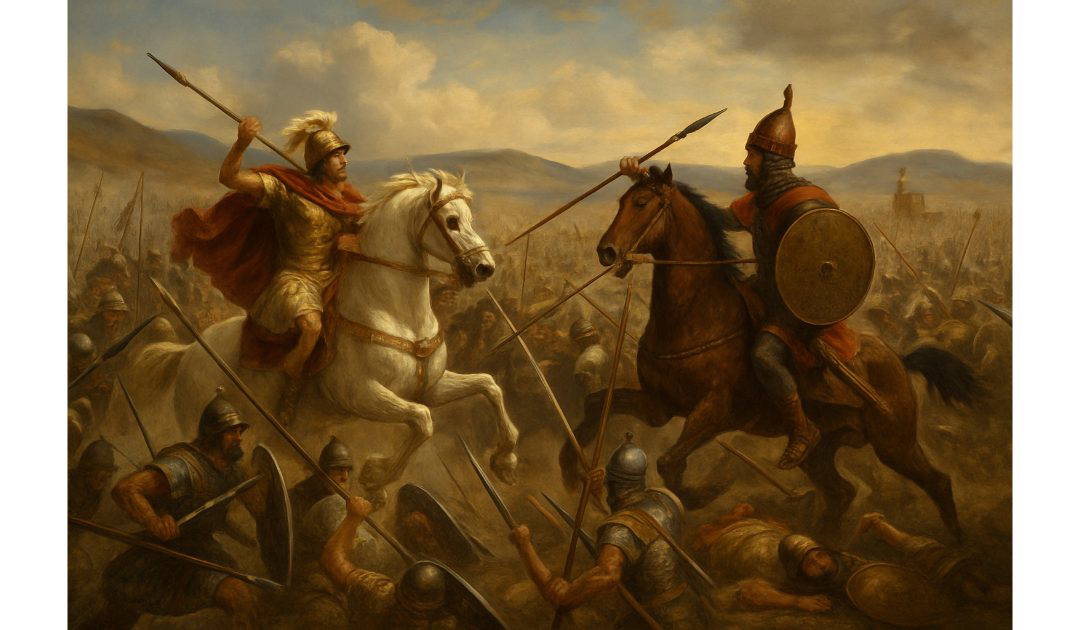On the 1st of October, 331 BC, Alexander the Great defeated King Darius III’s army at the Battle of Gaugamela. I’ve posted previously about an earlier clash between Persia and Greece, the Battle of Marathon.
Alexander the Great, born in 356 BC in Pella, the ancient capital of Macedonia, remains one of history’s most renowned figures. His life, though short, was marked by extraordinary military prowess, strategic brilliance, and a relentless quest for knowledge and expansion. The son of King Philip II and Queen Olympias, Alexander was poised for greatness from an early age, receiving an education under the tutelage of Aristotle, which instilled in him a love for philosophy, science, and the arts.
Alexander’s upbringing was a blend of rigorous military training and classical education. His father, a formidable king and general, ensured Alexander was well-versed in the art of warfare, while Aristotle cultivated his intellectual curiosity. This dual foundation prepared Alexander to assume leadership at the tender age of 20, following King Philip II’s assassination in 336 BC.
Upon ascending the throne, Alexander swiftly consolidated power, quelling rebellions and securing loyalty among the Greek city-states. His charisma and decisive leadership style earned him unwavering support, setting the stage for his ambitious campaign against the Persian Empire.
In 334 BC, Alexander embarked on his legendary military expedition to conquer Persia, a campaign that would span over a decade and cover vast territories. His first major victory at the Battle of Granicus showcased his tactical genius, as he led a daring cavalry charge that decimated the Persian forces.
Subsequent battles, including the pivotal Battle of Issus in 333 BC and theSiege of Tyre in 332 BC, further demonstrated Alexander’s strategic ingenuity. His ability to adapt to diverse combat scenarios and outmaneuver larger armies cemented his reputation as an unparalleled military commander.
The crowning achievement of his Persian campaign was the Battle of Gaugamela in 331 BC, where Alexander’s forces, though outnumbered, decisively defeated King Darius III’s army. This victory led to the fall of the Achaemenid Empire and marked Alexander as the unchallenged ruler of a vast expanse stretching from Greece to Egypt and into Asia.
Alexander’s vision extended beyond mere conquest; he aspired to integrate the diverse cultures within his empire. He adopted Persian customs, encouraged intermarriage between his soldiers and local populations, and founded numerous cities, most notably Alexandria in Egypt. These cities became centres of learning and cultural exchange, blending Greek and Eastern traditions.
His policy of cultural fusion, known as Hellenisation, facilitated the spread of Greek language, art, and philosophy throughout the conquered regions. This era of cultural amalgamation significantly influenced the development of the Hellenistic world, leaving a lasting legacy in fields such as science, architecture, and literature.
Driven by an insatiable desire for exploration, Alexander advanced into the Indian subcontinent in 326 BC. Despite facing formidable resistance, notably at the Battle of the Hydaspes against King Porus, Alexander emerged victorious. However, the campaign took a toll on his army, weary from years of warfare and longing to return home.
Acknowledging his troops’ exhaustion, Alexander decided to retreat, navigating through the treacherous Gedrosian Desert—a journey marked by extreme hardship and significant loss of life. Despite these challenges, Alexander’s resolve remained unshaken as he focused on consolidating his empire upon returning to Babylon.
Alexander’s final years were characterised by efforts to solidify his vast empire through administrative reforms, military planning, and further expansion. However, in 323 BC, at the age of 32, he fell gravely ill and died under mysterious circumstances. The exact cause of his death remains a subject of historical debate, with theories ranging from natural illness to poisoning.
Following his death, Alexander’s empire fragmented as his generals, known as the Diadochi, vied for control. Despite this political disintegration, the cultural and intellectual impact of his conquests endured, shaping the course of history for centuries.
Alexander the Great’s legacy is multifaceted. As a military commander, he remains a paragon of strategic brilliance and audacity. His campaigns revolutionised warfare, introducing innovative tactics still studied in military academies today.
Culturally, Alexander’s influence facilitated the spread of Greek civilisation across three continents, fostering an era of unprecedented cultural exchange and intellectual flourishing. The Hellenistic period that followed his conquests witnessed remarkable advancements in science, philosophy, and the arts.

